Touring mangroves in the Densu Delta Estuary, Ghana. The CRC worked with local oyster pickers to develop a management program to conserve the mangroves that house their oyster estuaries.
Where land and sea meet, resources abound. People living in coastal areas depend on the nearby ocean for food, recreation, transportation, employment, and income. URI’s Coastal Resources Center understands the delicate balance between utilizing those ocean resources and preserving them. With 50 years of experience and a dedicated staff of scientists, communicators, and other professionals, the CRC brings coastal communities in Rhode Island and around the world together to create and manage sustainable relationships with their coastlines.
By Todd McLeish
When then-Governor Donald Carcieri announced in 2007 that Rhode Island was going to host the nation’s first offshore wind farm, he turned to the Rhode Island Coastal Resources Management Council (CRMC)—the state’s regulatory agency for coastal issues—to develop the necessary policies, plans, and regulations to make it happen. And, as the council had done for nearly 40 years, it turned to the University of Rhode Island’s Coastal Resources Center (CRC) for assistance.
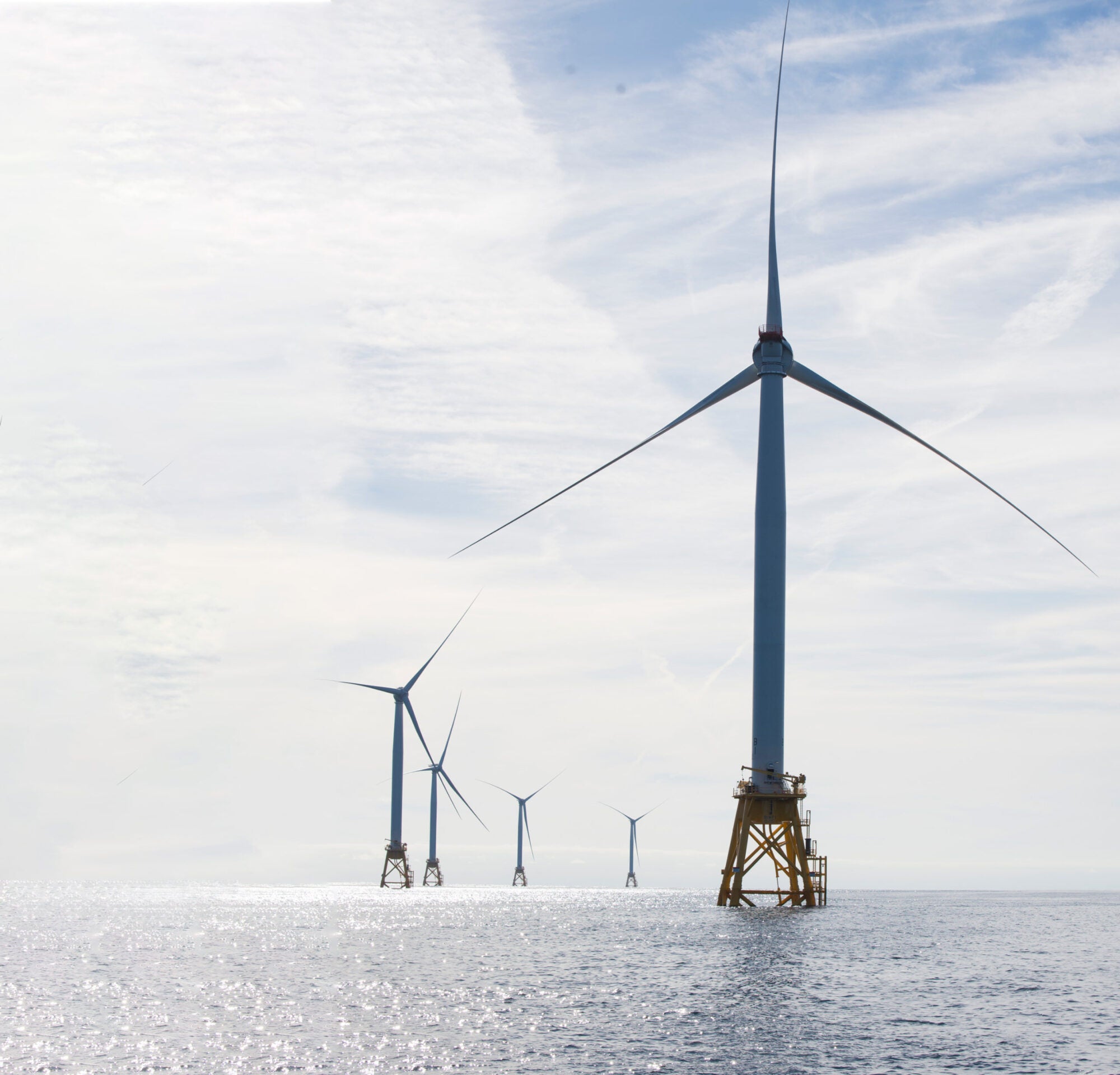
Over the next two years, CRC staff created what they called an Ocean Special Area Management Plan (Ocean SAMP), the nation’s first effort to develop a zoning plan for offshore wind in a marine region. The complex initiative included research by URI scientists into such diverse topics as marine geology, bird and whale migration, fish spawning, commercial and recreational fishing, shipping, cultural heritage, and tourism to identify the best location for a wind farm and a site that would create the least conflict with other user groups.
“It was a comprehensive look at our ocean and coastal resources and an enforceable plan to ensure that the way we develop that area of the water is balanced and considers the implications for the people of Rhode Island,” says Jennifer McCann, M.M.A ’94, the director of U.S. Coastal Programs for the Coastal Resources Center. “While it was driven by the governor’s desire to see offshore renewable energy off our coast, it wasn’t just about wind farms. We were able to increase the protection of various areas of our coast for economic development, for cultural reasons, and for environmental reasons that had nothing to do with offshore wind.”
“Coastal management is a place-based enterprise, and that place can be big or small.
Increasingly it’s the planet as a whole.”
—Stephen Olsen, M.S. ’70, former CRC director
That’s one reason the CRC has earned such respect and been so successful in the projects it has undertaken through the years. It has approached every coastal issue as a neutral observer, without preconceived notions, and with the needs of all stakeholders in mind. As a result, stakeholders buy into the process and are more likely to support the resulting decisions, even if they don’t get everything they want in the end.
“When the wind farm developers went to get their final permit, the environmentalists and the commercial fishermen and the Narragansett Tribe were all standing shoulder-to-shoulder saying, ‘We support this as long as you follow the Ocean SAMP,’” McCann says. “We had built this constituency that understood each other and supported each other, even though they came from different places. It’s a great example of the way we do things.”
The Coastal Resources Center has been advising governments and partner organizations on coastal issues—from aquaculture and coastal development to marine biodiversity and climate adaptation—for 50 years. Through it all, its 25-member URI-based team and numerous partners have used science and an inclusive participatory process to guide Rhode Islanders and people from around the world to find solutions to coastal challenges. As the organization looks back and celebrates its first half-century of achievements, it continues to confront emerging issues facing coastal zones and the people who live there.
Soon after the Rhode Island General Assembly established the R.I. CRMC in 1971—without staff and with a limited budget—the Rhode Island Board of Regents approved the creation of the Coastal Resources Center at URI to provide the council “with the information it needs to do its job.” According to Donald Robadue, M.C.P. ’76, CRC’s longest-serving staff member and its unofficial volunteer historian, the CRC’s initial focus was gathering information and writing reports about coastal zone science, which could be used to educate the government appointees who served on the council.
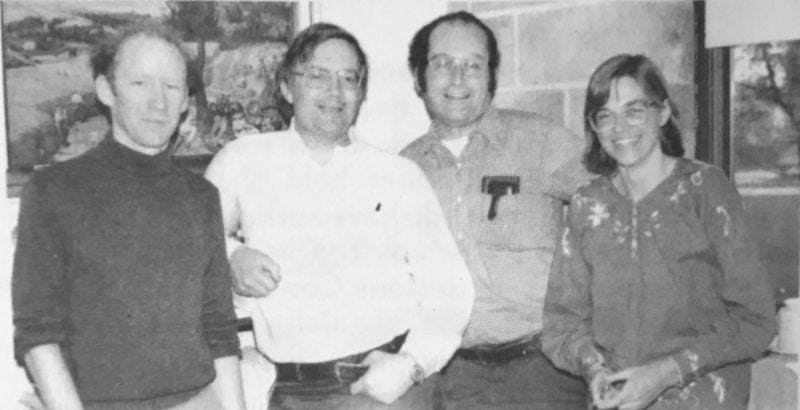
Left to right, Donald Robadue, M.C.P. ’76; Stephen Olsen, M.S. ’70; George Seavey; and Virginia Lee, M.S. ’79. All four were part of the early CRC staff, who Robadue describes as “renegade radical rabble-rousers charged with doing science and policy analysis hand in hand with the users who needed it.” 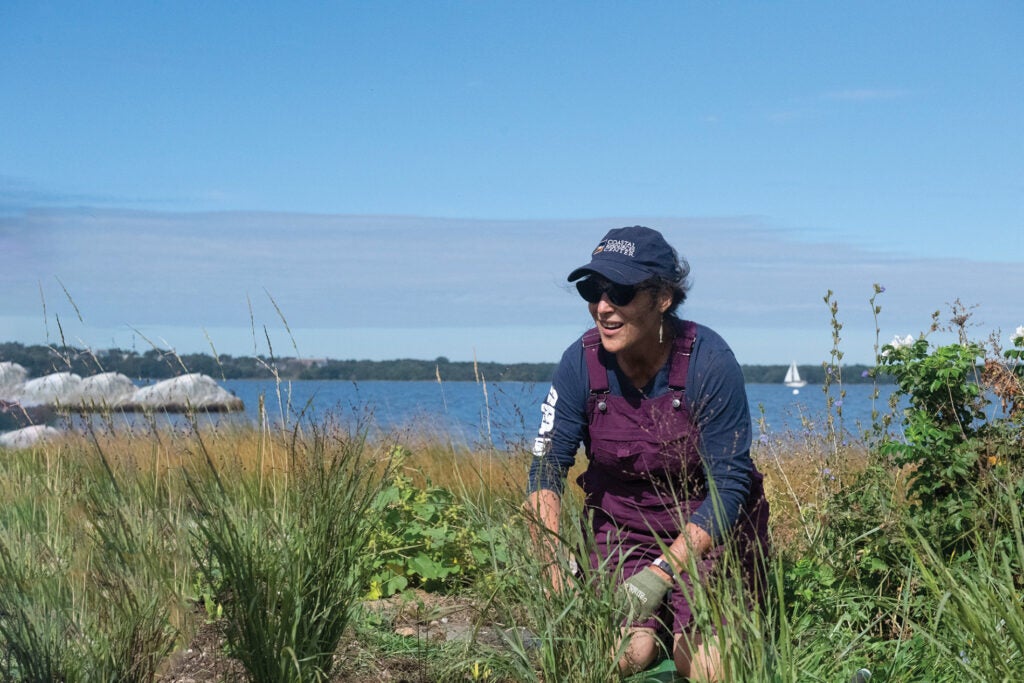
Pam Rubinoff, M.M.A. ’90, a coastal resilience specialist for CRC, planting buffer vegetation on Narragansett Bay to help prevent soil erosion.
Robadue describes the early CRC staffers as “a bunch of renegade radical rabble-rousers charged with doing science and policy analysis hand in hand with the users who needed it.” He adds, “We were probably the only university-funded group that raised money and did active policy work as if we were consultants to a very powerful agency.”
Stephen Olsen, M.S. ’70, was one of those early rabble-rousers, and served as CRC’s director from 1975 to 2012. He says the organization soon evolved into a place that understood how to identify the issues that people care about. “Coastal management is a place-based enterprise, and that place can be big or small. Increasingly it’s the planet as a whole,” Olsen says. “You’re there to work on issues that matter and to do that in a way that involves the stakeholders—not because you love stakeholders, but because you have to build a constituency and win their trust.”
That process of addressing challenging issues by building constituencies and winning trust was created by Olsen, Robadue, Virginia Lee, M.S. ’79, and other early staff members. It came to be called “the orders of outcome,” and it’s the same process CRC staff members follow today.
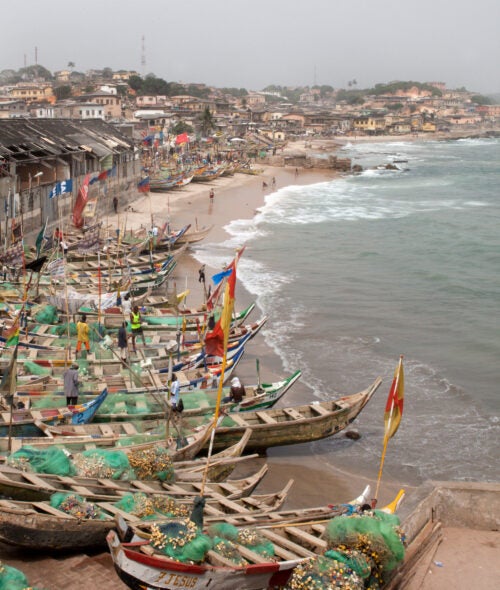
“It’s a process where you really need to establish enabling conditions in order to build the foundation of an effective, integrated coastal resources management effort,” says McCann. “You need clear goals, a strong commitment from different levels of government and resource users, the capacity to implement it, and a constituency to advocate for it. It’s a process that allows us to say, ‘We need to establish these enabling conditions before we can see change, before behaviors change, and before we see environmental, economic, and other social changes.’”
The process has been used by CRC to address development of fragile barrier beaches, dredging and dredge spoil disposal, sustainable port operations, changing fisheries, management of the state’s salt ponds, and more. But it was the success of the Ocean SAMP and the speed with which the nation’s first offshore wind farm was approved that found McCann and her colleagues—Pam Rubinoff, M.M.A. ’90, and Teresa Crean—in great demand. Agencies around the country and around the world sought them out for training to learn from their experience.
Yet the staff was also already moving on to other issues. In another partnership with the CRMC, they developed a Beach SAMP—a special area management plan for the Rhode Island coastline to help communities prepare for the impacts of rising sea levels and increasingly severe storms. The project led to changes in state policy and a mapping portal that allows residents to better understand their coastal risks. Another special area management plan is being developed to synthesize the science and develop practical state policies to guide the state’s use and management of Narragansett Bay resources.
One outgrowth of the Beach SAMP is the Providence Resilience Partnership, which mobilizes city business and civic leaders to advocate for infrastructure improvements in response to the growing threats from climate change. One of the leaders of the partnership is Curt Spalding, who has engaged with CRC for 30 years as director of Save the Bay, administrator of the U.S. Environmental Protection Agency’s Region 1, and now as a professor at Brown University.
“CRC has been a partner and asset through all of this time to move forward the issues I’ve been working on,” he says. “They obviously have a deep understanding of the environmental issues the coast and state are facing, and they’re very strategic. They have a clear idea of what needs to be done, and they bring a pragmatic ability to adapt to the circumstances of the challenge, which I think sets them apart. They know how to get things done in Rhode Island, and that’s not easy.”
One of CRC’s most recent efforts has been to evaluate the size and scope of Rhode Island’s blue economy—industries closely connected to and dependent on the state’s coasts and ocean—and to identify strategies to nurture and grow this important sector.
“It’s about figuring out the right amount that can be fished while still sustaining
a robust ecosystem.”
—Elin Torell, director, URI Coastal Institute and CRC International Programs
The influence of the Coastal Resources Center extends beyond Rhode Island. Its reach is felt across the country through its work with groups like the Northeast Regional Ocean Council, National Sea Grant College Program affiliates, and the National Park Service. However, the CRC may be best known for its international work in developing nations, where it has collaborated with governments in Africa, South America, Southeast Asia, and elsewhere since 1985. That’s when officials from the U.S. Agency for International Development (USAID) approached Olsen to advise other governments on coastal management.
“Internationally, the issues are about the same as in the U.S., but the speed at which things are changing in many places in the tropics is much, much faster,” says Olsen. “The changes that happened in Narragansett Bay over a century and a half occurred in about 20 years in the Gulf of Thailand.
“The huge difference is that in other countries, government is much less powerful and established, so it was really the marketplace and the public that was determining the evolution of change in a given place,” he adds. “We realized that we had to build capacity and promote a learning-by-doing process where we would work at relatively small scales. And it had extraordinary success.”
With funding from USAID, CRC initially launched 10-year projects in Ecuador, Sri Lanka, and Thailand, then moved on to Tanzania, Mexico, and Indonesia. Olsen is particularly proud of CRC’s work in Ecuador, where uncontrolled shrimp farming was transforming the coastline and residents were being driven out—and occasionally shot.
“We managed to get the president of the country to adopt a coastal management plan, and it really became a social governance project, which many onlookers said couldn’t be done,” he says. “For me personally, it was a huge affirmation that what we had learned in Rhode Island about the struggles between conservation and development could indeed play out in a very different place.”
In more recent years, USAID has funded CRC with $26 million for a sustainable fisheries management project in Ghana that began in 2014 and $25 million in 2018 for a similar project in the Philippines. At the time, these were the largest grants ever awarded to URI.
A demonstration for sustainable fisheries management in Komenda township, Ghana. Women are important in Ghana’s fisheries, and CRC helped give them a voice in management and decision-making.
According to Brian Crawford, M.M.A. ’86, Ph.D. ’09, who led the Ghana project and recently retired after working at CRC for 34 years, the goal was to rebuild Ghana’s marine fish stocks, which were collapsing due to overfishing. It was a food security issue, since the fish involved—mostly anchovies, sardines, and mackerel—are almost all consumed locally.
Working closely with the Ministry of Fisheries and Aquaculture Development and the Ghana Fisheries Commission, Crawford and his team succeeded in developing three community-based fisheries management plans, worked with fish processing groups to develop a healthier and more efficient fish smoker design—and a supply chain for building them—and ensured that the fishers had a voice in management decisions. They even piloted a social safety net system to support vulnerable fishing families during the COVID pandemic that can also be applied in the future if closed fisheries result in significant loss of income.
“We made a lot of progress in getting the government to be more open to involving fisherfolk in the management of the fishery,” Crawford says. “That was a major step forward, as demonstrated by the closure in 2019, when there was near-perfect compliance by fisherfolk. Prior to that, every time the government put a regulation in place, there was virtually no compliance because it was imposed from the top down. Rather than pointing fingers, now they’re cooperating and working together toward more sustainable practices.”
In the Philippines, CRC has established a Fish Right Program to help the government there implement a system of fishery management areas to boost the biomass of the fish harvested. “It’s about figuring out the right amount that can be fished while still sustaining a robust ecosystem,” says Elin Torell, director of URI’s Coastal
Institute and CRC’s international programs. “It’s also about how to control the harvest by using closed seasons, marine protected areas, or other measures, like the quotas used in the U.S.”
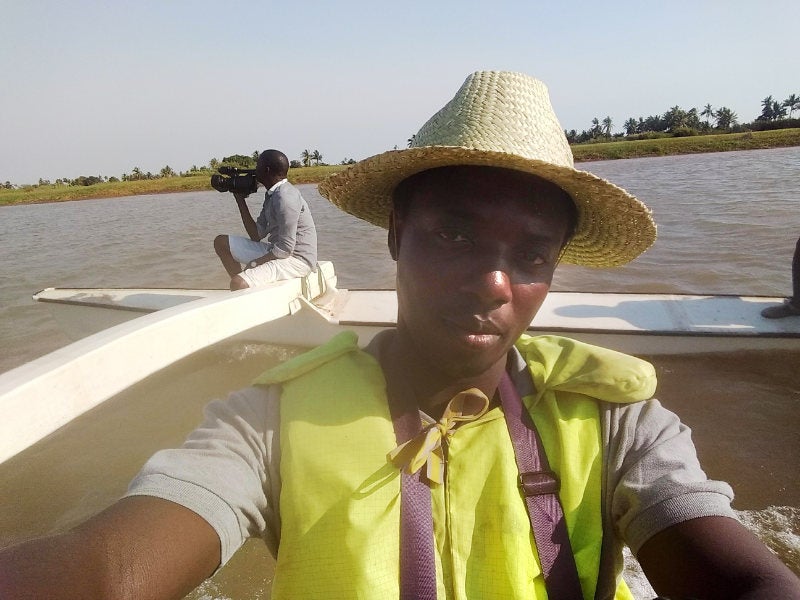
Justice Mensah, M.S. ’13, worked with CRC in Ghana and was selected for a scholarship to enroll at URI. He returned to Ghana where he works in fisheries management as a GIS and remote sensing expert. 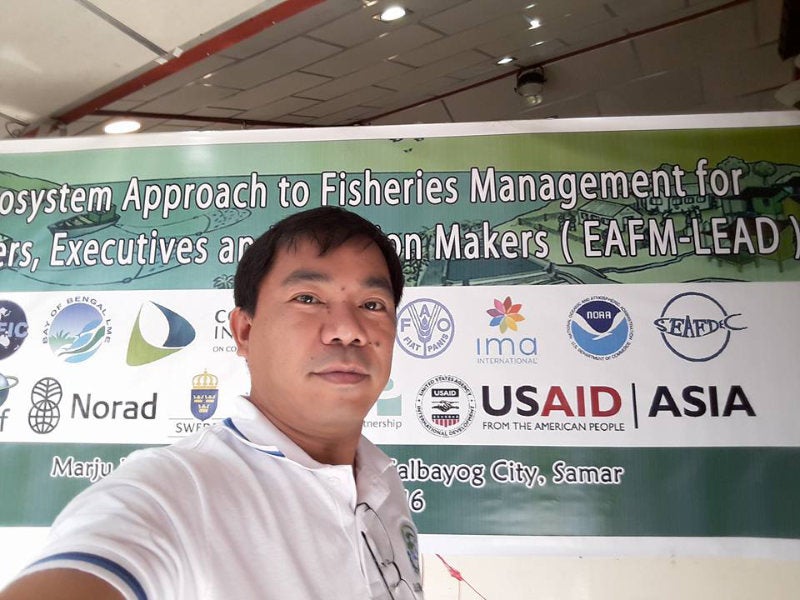
Like Mensah, Ronnie Romero, M.M.A. ’21, worked with CRC, was awarded a scholarship to URI, and returned to his home country to work in fisheries management. Romero, from the Philippines, is a senior science research specialist who develops holistic fishery policies.
Additional projects are currently underway in Malawi, Madagascar, Senegal, Nigeria, Kenya, Bangladesh, Cambodia, and elsewhere. In 2021, CRC was awarded $15 million from USAID to help communities in several Pacific Island countries develop sustainable fisheries.
“Solutions require bringing people together and understanding the problems and then,
together, coming up with a solution for that place and time.
—J.P. Walsh, director, Coastal Resources Center
Torell says all of CRC’s international projects focus on empowering women in the community. In Ghana, women play an important role in the fisheries—through boat ownership, post-harvest processing, and other ways—but they were seldom allowed to participate in discussions about the fisheries. Now they can, thanks to membership on management committees and leadership training that helps them feel comfortable speaking out. Similarly, in the Philippines, where women collect oysters and mussels in intertidal zones, CRC helped to establish harvesting areas managed by women and provided economic training and tools to make their businesses more successful.
“CRC has become a global leader in women’s empowerment in the fisheries sector,” Torell says. “We look at women’s economic empowerment and decision-making: How and when do they engage? What are the barriers to their engagement? We’re making great strides in supporting their role in the fisheries, which is good for the whole community.”
Another vital element in all of CRC’s international projects is building the human capacity to ensure that project momentum can be sustained after CRC departs the region. In many places, training is offered—either in country or at URI—in fisheries management, climate change and coastal adaptation, and related topics, and many governments continue to request such training. Participants usually come from partner agencies and local universities.
Capacity building also often includes awarding scholarships to allow staff members from partner organizations to earn graduate degrees at URI in disciplines of critical need for their countries so they can bring what they learn back home and apply it in their future work.
Women sorting and drying fish in the Philippines.
“Ultimately, that’s going to be what’s most lasting and affects sustainability,” Crawford says. “The proof in the pudding is what happens when a project ends. Does it carry on?”
Justice Mensah, M.S. ’13, was a teaching assistant at the University of Cape Coast in Ghana during the early stages of CRC’s work in that country, and he was selected for a scholarship to enroll at URI to continue his interest in geographic information systems (GIS), which he had been applying to CRC’s fisheries management project. Since completing his degree, he has been a GIS and remote sensing expert working on fisheries management for a local nonprofit group, Hen Mpoano (Our Coast).
“CRC literally held my hand, ushered me into my career, and continued to give me opportunities to grow and explore more territories within my career pathway,” he says. “Over the past decade, the interventions of CRC in Ghana have impacted the lives of hundreds, changed some wrong attitudes and behaviors in fisheries, built capacities of individuals and institutions, empowered vulnerable and marginalized people, and made very important contributions to national policies on fisheries. CRC will always be remembered for laying the foundation for sustainable fisheries management in Ghana.”
Fishers haul in nets at a marine sanctuary in the Visayan Sea in Cadiz, Philippines, where the CRC led the $25 million USAID-funded Fish Right Program to help the government implement a fisheries management system. Below, women sorting and drying fish in the Philippines.
Ronnie Romero, M.M.A. ’21, is making sure that CRC’s work carries on in the Philippines. A research assistant at the Philippines National Fisheries Research and Development Institute (NFRDI) when he was awarded a scholarship to URI, his thesis examined his country’s new ecosystem-based approach to fisheries management policies that were introduced through CRC’s Fish Right Program. He says that the Philippines’ new model of fisheries management is making fisheries more sustainable and gives the fishing community more of a voice in its management.
“I have been deeply involved in crafting fishery policies, and my master’s degree has provided me with the tools for crafting holistic policies,” says Romero, now a senior science research specialist at NFRDI. “I came to URI because I believe that its interdisciplinary approach best suits me toward improving the performance of my duties and functions as a member of my institute’s policy-making working group.”
Building human and institutional capacity to continue the work of the Coastal Resources Center is a crucial element of its success. The trainees and graduate students and hundreds of others who have worked closely in dozens of different projects, both locally and abroad, continue to carry the CRC message into all that they do.
“That network is strong, and we stay in touch with them,” he says. “They’re now major players in the middle management and senior management of the coastal and fisheries sectors of major governments around the world. They are an institutional force for change.”
The CRC staff, many of whom have earned at least one degree from URI, are a force to be reckoned with as well.
“The success of the Coastal Resources Center is mostly about the people we have and the approach they take,” says J.P. Walsh, CRC’s director since 2018. “Solutions require bringing people together and understanding the problems and then, together, coming up with a solution for that place and time. We guide that process and help with science understanding so they can see what solutions may work, and we help them in the decision-making process. We hold their hand along the way so they can see the science and see the problem and see the solution. And it works.”
“We’re committed to our cause, we’re passionate about what we do, we have great technical expertise, and we want to continue to learn,” adds McCann. “We don’t just rest on our laurels. We know we have to learn and do better, and we love to partner. We love working at CRC because we feel like we’re making this world a
better place.” •
CRC Squad
The team is everything for the Coastal Resources Center. With a dedicated and talented staff of approximately 25, the team manages a broad portfolio of projects around the world. Their love of the ocean and understanding of the importance of healthy coasts and coastal communities unites and motivates them. CRC team members gathered at the shoreline of the Narragansett Bay Campus, where their offices are housed, in April 2022.
Back row: J.P. Walsh, director; Brittni Ferguson, coordinator, international programs; Sarah Gaines, coastal research associate; Glenn Ricci, coastal research associate; Cindy Moreau ’97, coordinator, international programs (retired); Peter Freeman, coastal research associate; Cathy Dwyer ’93, coordinator, international programs; Elin Torell, director, Coastal Institute and CRC international programs
Front row: Jen McCann, M.M.A. ’94, director of U.S. coastal programs; Sue Kennedy, communications specialist; Karen Kent (seated in front), senior coastal manager; Tyler Pavlowich, marine research associate; Lauren Josephs, M.S. ’17, coastal research associate; April Pariseault ’91, coordinator, U.S. programs
